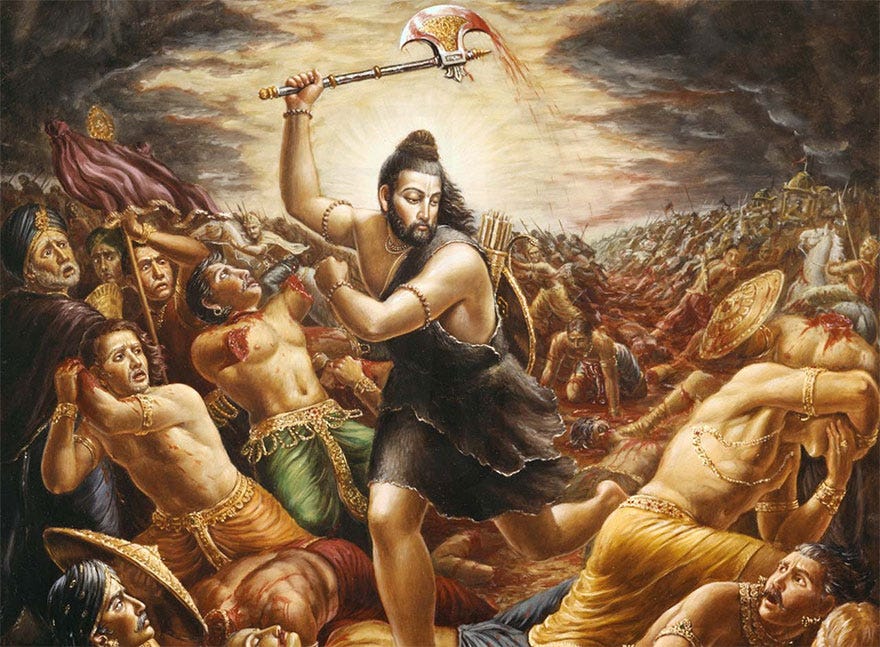SUBHASHITHANI:354
जातमात्रं न यः शत्रुं रोगं च प्रशमं नयेत् ।
महाबलोऽपि तेनैव वृद्धिं प्राप्य स हन्यते ॥१.२५६॥
Jaata
maatram na yah shatrum rogam cha prashamam nayet I
Mahabalo
api tnaiva vruddhim praapya sa hanyate II256
He who does not nip in the bud, an enemy or a disease that makes an
appearance, gets killed by them even if he is strong in body and mind.
கைகொல்லும் காழ்த்த இடத்து. Thirukkural-879
Matured by time, 'twill pierce the hand that plucks it thence.
समौ हि शिष्टैराम्नातौ वर्त्स्यन्तावामयः स च ॥१.२५७॥
Samau hi shishtairaamnaatau vatsaryantaavaamayah sa cha II257
A
rising enemy should not be neglected by one desiring one’s welfare; For the
wise declare that both the enemy and a disease are of equal power.
उपेक्षितः क्षीणबलोऽपि शत्रुः
प्रमाददोषात्पुरुषैर्मदान्धैः ।
साध्योऽपि भूत्वा प्रथमं ततोऽसाव्
असाध्यतां व्याधिरिव प्रयाति ॥१.२५८॥ 258
An enemy even though weak if neglected by men blinded with pride through the fault of carelessness , then he, although manageable at first , becomes difficult to be subdued afterwards like a disease, which though easily curable initially , becomes incurable if neglected at the early stage.
आत्मनः शक्तिमुद्वीक्ष्य मनोत्साहं च यो व्रजेत् ।
बहून् हन्ति स एकोऽपि क्षत्रियान् भार्गवो यथा ॥१.२५९॥
Aatmaanah
shaktim udveekshya manotsaaham cha yo vrajet I
Bahoon hantti a ekopi kshatriyaan bhargavo yatha II259
He, who will attack his enemies after having gauged his strength and consulted his self-respect and energy, kills many though one (unaided) as Parasurama.
अविदित्वात्मनः शक्तिं परस्य च समुत्सुकः ।
गच्छन्नभिमुखो वह्नौ नाशं याति पतङ्गवत् ॥१.२६०॥
Aviditvaatmanah
shaktim parassya cha samutsukah I
Gachannabhimukho
vahnau naasham yaati patangavat II260
He who without assessing his own strength as well as that of his enemy , attacks him through eagerness( in haste ) , meets with destruction like a moth in fire.
வினைவலியும் தன்வலியும் மாற்றான் வலியும்
துணைவலியும் தூக்கிச் செயல்.Thirukkural-471
Let one weigh
well the strength of the strife , his own strength, the strength of his
enemy, and the strength of the allies (of both), and then let him act.
यो बलात्प्रोन्नतं याति निहन्तुं सबलोऽप्यरिम् ।
विमदः स निवर्तेत शीर्णदन्तो गजो यथा ॥१.२६१॥
Yo
balat pronnatam yaati niantum sabalo apyarim I
Vimadah
sa nivarteta sheernadanto gajo yatha II261
He,
who through the pride of his strength marches forth to destroy a powerful enemy,
comes back , shorn of his pride, though strong, just as an elephant returns
humble and with his tusks broken when going to crush a hard rock.
अपृष्टो ऽपि हितं वक्ष्येद् यस्य नेच्छेत् पराभवम् ॥ २६२ ॥
priyaṃ vā yadi vā dveṣyaṃ śubhaṃ vā yadi vāśubham |
apṛṣṭo ‘pi hitaṃ vakṣyed yasya necchet parābhavam || 262 ||
Whether it is unpleasant or pleasant, what may be good or bad (to his interest), one should point out to him whose defeat one does not wish for.

No comments:
Post a Comment